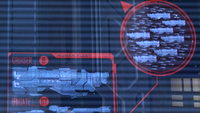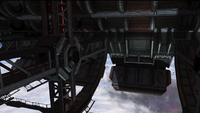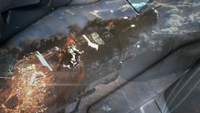Marathon-class heavy cruiser: Difference between revisions
From Halopedia, the Halo wiki
NightHammer (talk | contribs) m (I'm near certain those are Marathons) |
|||
| Line 68: | Line 68: | ||
File:Master Chief Collection - Cruiser destroyed.png|A ''Marathon'' class cruiser getting destroyed in the [[Halo: The Master Chief Collection announcement trailer]]. | File:Master Chief Collection - Cruiser destroyed.png|A ''Marathon'' class cruiser getting destroyed in the [[Halo: The Master Chief Collection announcement trailer]]. | ||
File:HomeFleetH2A.png|The back of a ''Marathon''-class heavy cruiser. | File:HomeFleetH2A.png|The back of a ''Marathon''-class heavy cruiser. | ||
File:Fifth Fleet - H2A.png|Numerous ''Marathon''s of the UNSC Home Fleet hold position above Earth. | |||
</gallery> | </gallery> | ||
Revision as of 14:36, January 1, 2015
The Marathon-class heavy cruiser is a cruiser classification used by the UNSC Navy with a hull classification symbol of CA.[1] Built as a replacement for the aging Halcyon-class light cruiser, the Marathon class is nearly 1.2 kilometers in length, making it one of the largest warships used by the UNSC.[2] Due to their limited numbers, Marathon-class cruisers are typically commanded by officers of the Rear Admiral rate or higher and are commonly used as flagships.[2] The class is named for the historical Battle of Marathon.
Overview
Design
At 1192 meters long, Marathon-class heavy cruisers are approximately three times the length of a typical frigate. Marathons have 191cm-thick layers of Titanium-A armor, allowing them to sustain far greater damage than any frigate or destroyer. Marathon-class cruisers sport two Magnetic Accelerator Cannons and an unknown number of point defense guns.[2] In addition to their integrated armament, the cruisers have dozens of oversized M58 Archer missile pods containing dozens of missiles each, as well as five fusion rockets.[2]
Marathon-class vessels have a similar profile to their predecessors, the Halcyons, though their ventral surfaces are concave rather than flat. A large deployment bay containing Single Occupant Exoatmospheric Insertion Vehicles, known by Orbital Drop Shock Troopers as "Hell's waiting room", is located amidships.[3] Marathons can carry two dozen GA-TL1 Longswords[2] in addition to numerous D77-TC Pelicans and other ground and air vehicles. Vessels of the class can also carry large Marine complements, likely of battalion strength.[note 1]
Service history
Several Marathon-class heavy cruisers served in Battle Group X-Ray under Vice Admiral Preston Cole during the Second Battle of Harvest. Throughout the early years of the Human-Covenant War, Cole continued to command Marathons as part of his Third Fleet. Several Marathons from the fleet, including the Template:UNSCship, participated in the Harvest campaign.[4][5]
As their numbers were diminished by the onslaught of the Covenant, many Marathons were reassigned to the defense of the Inner Colonies during the later years of the Human-Covenant War.[6][note 2] Marathons were present at the Battle of Sigma Octanus IV in July 2552, including Vice Admiral Michael Stanforth's flagship Leviathan, which was severely damaged during the battle. Numerous Marathon-class cruisers participated in the Fall of Reach.
At least eight Marathon-class cruisers assigned to the UNSC Home Fleet were present at the onset of the Battle of Earth. Led by Fleet Admiral Harper and supported by sixty-seven frigates, these ships formed a defensive perimeter around the orbital defense platform cluster over the Mediterranean.[7] Admiral Carl Patterson's battle group, drawn from the Home Fleet, was led by the Template:UNSCship during the Battle of Onyx. Several Marathon-class cruisers of the Home Fleet were supposedly destroyed over the course of the battle for Earth, particularly after the final wave of Covenant reinforcements arrived.[8]
Most remaining Marathon-class cruisers were decommissioned after the Autumn-class heavy cruiser was introduced, with only a handful staying in service.[9]
Ships of the line
- UNSC Canberra – Fleet Admiral J. Harper's flagship; led the Fifth Fleet against the Covenant during the Battle of Earth on October 20th, 2552.
- UNSC Dresden – Destroyed over Biko in 2525 or 2526. Carried a saddle box drive.[10]
- UNSC Prophecy – Destroyed during the Harvest campaign in February 2531.[4][5]
- UNSC Leviathan – Vice Admiral H. M. Stanforth's flagship. Severely damaged during the Battle of Sigma Octanus IV in July 2552.
- UNSC Hannibal – Destroyed during the Fall of Reach on August 30, 2552.[11]
- UNSC Marathon – The lead ship of the class.
- UNSC Say My Name – Deployed ODSTs to board Solemn Penance during the Battle of Mombasa on October 20, 2552.[3]
Trivia

|
Browse more images in this article's gallery page. |
Though in-universe the class is named for the Battle of Marathon, in reality its name is a reference to Bungie's Marathon trilogy and its eponymous ship, the UESC Marathon.
Gallery
- UNSC Prophecy.png
The UNSC Prophecy.
- Outcome of Second Battle of Harvest.png
Several Marathon-class heavy cruisers engaging a Covenant super-destroyer at the Second Battle of Harvest.
ODSTs gathered around a holo-table inside a Marathon-class cruiser.
A Marathon class cruiser getting destroyed in the Halo: The Master Chief Collection announcement trailer.
List of appearances
Notes
- ^ Cite error: Invalid
<ref>tag; no text was provided for refs namedcomplement - ^ According to Halo: The Fall of Reach, as of July 2552 the Leviathan was one of twenty cruisers left in the Fleet, presumably referring to the entire Navy. Even if one assumes that this refers only to FLEETCOM Sector One, this number is clearly retconned in later media.
Sources
- ^ Halo: The Essential Visual Guide, page 42
- ^ a b c d e Cite error: Invalid
<ref>tag; no text was provided for refs namedENC - ^ a b Halo 3: ODST, campaign level Prepare to Drop
- ^ a b Halo Wars: Genesis
- ^ a b Halo wars in-game timeline
- ^ Halo: The Fall of Reach, page 162
- ^ Halo 2, campaign level Cairo Station
- ^ Halo 3, campaign level Crow's Nest
- ^ Halo 4: The Essential Visual Guide, page 191
- ^ Halo: First Strike (2010), Tug o' War
- ^ Halo: First Strike, page 168









